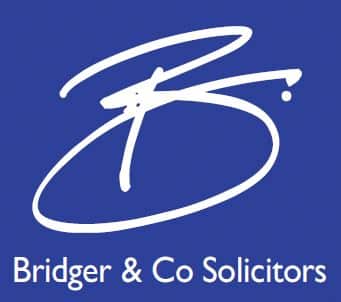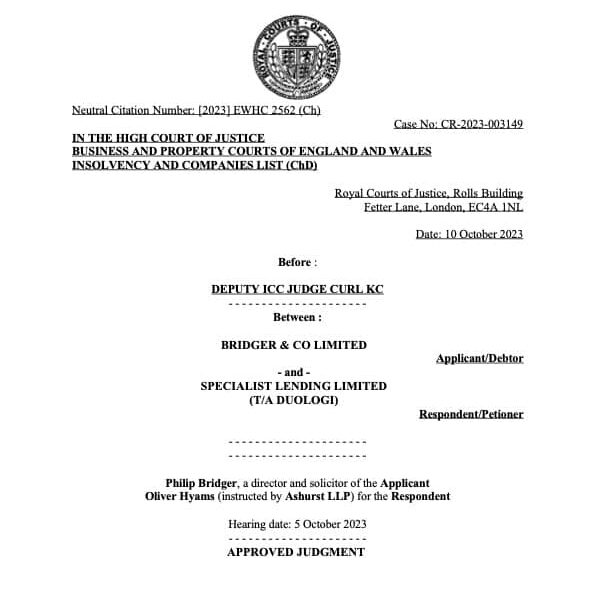In a recent legal battle, the High Court has refused to grant an injunction to restrain the creditor of a Welsh law firm, Bridger & Co Limited, which owes £2.2 million to disbursement funder Specialist Lending Ltd, trading as Duologi. The Winding-up Petition against Bridger & Co was filed on 15 June 2023 under case number: CR-2023-003149. The injunction by Bridger & Co sought to prevent Duologi from advertising a winding-up petition to other creditors after service of a statutory demand.
Subsequently, the Petition was advertised in The Gazette on 11 October 2023 and was heard at the High Court of Justice, Rolls Building, Fetter Lane, London EC4A 1NL on Monday 23 October 2023, at 10:30 AM. This dispute highlights the complexities of disbursement funding agreements and the responsibilities of parties involved.
Background of the Statutory Demand Dispute
Bridger & Co entered into a disbursement funding agreement with Duologi in March 2020 to finance cavity wall insulation claims. One of the triggers for repayment of disbursements funded through this agreement was the expiry of 24 months following the initial drawdown for individual claims.
Duologi had issued a statutory demand for payment of approximately £2.2 million, and the subsequent dispute was centred on whether Duologi was entitled to be repaid after two years or if payment was limited to recoveries from the claims.
The director of Bridger & Co, Andrew Bridger, argued that Duologi had misrepresented the funding agreement, claiming that the inclusion of the ’24 months’ clause was only for setting an end date and that he expected the claims to be resolved sooner. He also stated that Duologi had assured the firm they would not be ‘heavy-handed’ if the cases took longer to settle.
The following month, Duologi also presented a winding-up petition. In response, the law firm sought an injunction to prevent the advertisement of the petition.


What was the London Court’s Injunction Decision?
Deputy ICC Judge Curl KC found Bridger’s arguments unconvincing. The judge pointed out that the inclusion of a two-year end date in the agreement was an acknowledgment that at some point, sums would need to be repaid if the claims failed. The representation that Duologi would not be heavy-handed did not imply that they would waive their right to recourse if sums remained unpaid.
When asked about the consequences if Bridger & Co halted the claims, Bridger argued that Duologi would have no recourse for payment. The judge concluded that this perspective seemed to place the entirety of the risk on Duologi, allowing Bridger & Co to potentially profit risk-free even if the claims were unsuccessful or abandoned.
The judge addressed various arguments raised by Philip Bridger, the law firm’s director, and rejected them. He stated that the disbursement funding agreement provided Duologi with the right, though not the obligation, to “lift and shift” cases. Furthermore, the law was clear that Duologi had the standing to present the petition, even if it held security for the petition debt.
The judge concluded that Duologi was entitled to recourse against Bridger & Co for the repayment of sums due 24 months after being advanced, and that the representation about not being heavy-handed suggested they would have such rights of recourse without being overly aggressive in exercising them.
Download Injunction Judgment Here
Significance of Injunction to Restrain Petition Case
This case serves as a reminder to businesses and legal entities to carefully consider the terms and conditions of funding agreements, as well as to maintain clear communication with all parties involved to prevent misunderstandings and disputes. It also illustrates the courts’ commitment to upholding the written terms of agreements, even when parties argue that representations made during negotiations should take precedence.
Advertising Winding Up Petition in The Gazette
The Insolvency Rules 2016 require notice of a winding up petition to be advertised in The Gazette by the petitioner. The purpose of giving such notice is to inform other creditors and contributories of the company of the fact that a petition has been presented against the company and to enable them to attend the hearing and make submissions to the court. The advertisement can appear just seven days after service of the petition.
Once it has been advertised, a winding up petition may not be withdrawn and it must proceed to be heard by the court. It is inevitable that the petition will upon advertising come to the attention of the company’s bank and creditors as well as possibly others (such as the company’s employees, suppliers and customers). This can lead to the company’s bank accounts being frozen and may seriously damage the reputation and financial stability of the company.
How to Obtain an Injunction Against Winding Up Petition Advertisement
If you have been served with a Winding Up Petition, we can help you obtain an injunction against its advertisement in The Gazette.
To obtain an injunction to restrain advertisement of a winding up petition, you need to prove that the petition either amounts to an abuse of process, as was in this case, or is bound to fail. Here are some examples of circumstances in which the court may grant such an injunction:
- Genuine Dispute: If the alleged debt mentioned in the petition is genuinely disputed by the company on substantial grounds, you can seek an injunction. In this case, you must have valid reasons for disputing the debt.
- Cross-Claim or Right of Set-Off: If the company has a genuine cross-claim or a right of set-off with substantial grounds, either equal to or exceeding the petition debt or at least £750 less than the petition debt, you may have a basis for obtaining an injunction.
- Legal or Factual Failure: If the petition is bound to fail either as a matter of law (e.g., because the debt is statute-barred) or as a matter of fact, you can seek an injunction.
- Oppression or Unfairness: If the petition is considered oppressive or unfair to the company, you may have a case for an injunction. This might involve a situation where the petitioner is acting in a way that is seen as unjust or harsh.
- Collateral Purpose: If the petition has been presented by the alleged creditor for reasons other than seeking to get the company wound up (a collateral purpose), you may be able to obtain an injunction. The petitioner must have a legitimate reason for presenting the petition.
- Alternative Remedy: If the alleged creditor has another, more appropriate remedy available to them, but they do not intend to pursue it and are instead using the winding-up petition as a means to an end, an injunction may be granted.
The procedure for seeking an injunction to restrain the advertisement of a winding up petition typically follows these steps:
- Application: The application for an injunction must be made in accordance with the requirements outlined in the Insolvency Rules.
- Written Application: The application should be in writing and signed by the applicant or their solicitor.
- Supporting Evidence: The application must be supported by evidence, usually in the form of a witness statement with exhibits. The witness statement should outline the grounds on which it is alleged that the petition amounts to an abuse of process or is bound to fail. This evidence is crucial in demonstrating that the petition does not have a valid basis.
- Judicial Review: The application must be listed before a judge, who will review the evidence and arguments presented and decide whether to grant the injunction.
It’s important to note that obtaining an injunction in these cases is not automatic and requires a strong case supported by substantial evidence. If you are facing a winding-up petition and believe you have valid grounds for seeking an injunction, it is advisable to seek legal advice and assistance to navigate the legal process effectively. We at LEXLAW has the experience and expertise to help you successfully obtain an injunction against the advertisement of the winding up petition.
Legal Expertise in UK Winding-up Petitions
We understand that winding up petitions are not your everyday legal proceedings. They require a deep understanding of company law, insolvency law, and a keen sense of strategy. Our team of seasoned lawyers specialise in winding up petitions, bringing years of experience and a proven track record to the table. When you partner with us, you gain access to:
- Expertise in Company Law: Our solicitors are well-versed in the intricacies of company law, allowing us to identify situations where winding up petitions are the most effective course of action. We understand the nuances of unpaid debts, contractual obligations, and the legal remedies available to creditors.
- Strategic Approach: Crafting a compelling winding up petition requires careful planning and strategy. We take the time to analyse your specific case, gathering evidence and building a strong legal argument to present in court. Our goal is to maximise your chances of success and secure the outcome you deserve.
- Customised Solutions: Every business dispute is unique, and we tailor our approach to fit the specific needs of your case. Whether you are a creditor seeking repayment or a company facing financial distress, we have the expertise to guide you through the legal process.
- Negotiation Skills: In some cases, negotiation can lead to a favourable resolution without the need for winding up. Our solicitors excel in negotiation, working tirelessly to reach settlements that protect your interests and maintain business relationships whenever possible.
- Courtroom Prowess: When litigation becomes necessary, our solicitors are seasoned advocates in the courtroom. We are well-prepared to present your case with precision and confidence, striving for the best possible outcome.
There is an absolute importance in gaining the advantage of having legal experts who specialise in winding up petitions by your side. Without specialist knowledge and experience, creditors will find it challenging to recover their debts and companies facing financial difficulties may miss out on potential solutions and we have the knowledge and expertise to do just that.
In the world of business, disputes can arise unexpectedly, and unpaid debts can pose a significant threat to your company’s financial stability. When faced with such challenges, having a specialised law firm like LEXLAW Solicitors & Barristers on your side can make all the difference. Whether you are a creditor seeking to recover a debt or a business facing financial challenges, we offer expert legal guidance to navigate this intricate process. Contact us to today to allow us to help you every step of the way.
Check Your Insolvency Case ✔
We analyse your winding-up petition prospects. We deliver strategic legal advice at your first meeting. We get optimal legal results. Want a first or second opinion on your case? Click below or call our lawyers in London on ☎ 02071830529
WARNING – OBTAIN SPECIFIC GUIDANCE & ADVICE
The information on this website is not legal advice; you should always obtain specific advice on the circumstances of your case. Our Winding-up Petition Solicitors & Barristers provide specialist legal advice based on decades of expertise. Click here or call +442071830529 to get in touch. For regulatory reasons we do not take on low value cases nor provide free legal advice, information or guidance and our team cannot answer questions from non-clients.

